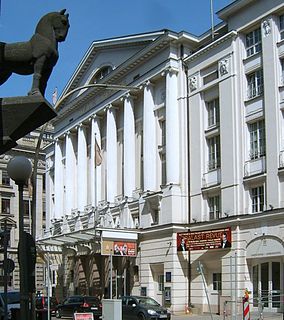Related Research Articles

German literature comprises those literary texts written in the German language. This includes literature written in Germany, Austria, the German parts of Switzerland and Belgium, Liechtenstein, South Tyrol in Italy and to a lesser extent works of the German diaspora. German literature of the modern period is mostly in Standard German, but there are some currents of literature influenced to a greater or lesser degree by dialects.

Ulrike Marie Meinhof was a West German far-left militant. She co-founded the Red Army Faction in 1970, after having worked as a journalist for the monthly left-wing magazine konkret. She was arrested in 1972, charged with numerous murders and the formation of a criminal association. In 1976, before the trial concluded, Meinhof was found hanged in her prison cell. The official statement claimed that Meinhof had committed suicide; however, several facts led to public controversy about her death.

Elfriede Jelinek is an Austrian playwright and novelist. She was awarded the Nobel Prize in Literature in 2004 for her "musical flow of voices and counter-voices in novels and plays that, with extraordinary linguistic zeal, reveal the absurdity of society's clichés and their subjugating power".

Ignaz Vincenz Zingerle was an Austrian poet and scholar.
Marieluise Fleißer was a German author and playwright, most commonly associated with the aesthetic movement and style of Neue Sachlichkeit, or New Objectivity.

The Thalia Theater is one of the three state-owned theatres in Hamburg, Germany. It was founded in 1843 by Charles Maurice Schwartzenberger and named after the muse Thalia. Today, it is home to one of Germany's most famous ensembles and stages around 9 new plays per season. Current theatre manager is Joachim Lux, who in 2009/10 succeeded Ulrich Khuon.

Weimar Classicism was a German literary and cultural movement, whose practitioners established a new humanism from the synthesis of ideas from Romanticism, Classicism, and the Age of Enlightenment. It was presumably named after the city of Weimar, Germany, because the leading authors of Weimar Classicism lived there.
Nicolas Stemann is a German theatre director. He is best known for directing the 2002 stage production of Hamlet at Schauspiel Hannover, a theatre in Hanover.

Elfriede Gerstl was an Austrian author and Holocaust-survivor. Gerstl, who was Jewish, was born in Vienna, where her father worked as a dentist.
Was geschah, nachdem Nora ihren Mann verlassen hatte; oder Stützen der Gesellschaften is a play by Austrian playwright Elfriede Jelinek. It was first published in 1979 and premiered in October that year, directed by Kurt-Josef Schildknecht, in Graz.
Das Schweigen (Silence) is a play by the Nobel Prize winning Austrian playwright Elfriede Jelinek. It premiered in 2000 at the Deutsches Schauspielhaus theatre in Hamburg, Germany. It was published that year in a combined volume with two other Jelinek plays, Das Lebewohl and Der Tod und das Mädchen II. All three plays referenced German classical music composers. In Das Schweigen, a woman attempts to write about the composer Robert Schumann.
Der Tod und das Mädchen II is a play by the Nobel Prize winning Austrian playwright Elfriede Jelinek. It premiered in Hanover, Germany, in 2000. It was published that year in a combined volume with two other Jelinek plays, Das Lebewohl and Das Schweigen (Silence). All three plays referenced German classical music composers.
Mülheimer Dramatikerpreis, founded in 1976, is one of the leading theater awards in Germany. It is awarded by an open jury of theater professionals, critics and playwrights who watch a short list of productions during the Stücke festival; the productions are not the full play but a piece, often the first act. The short list is chosen by a jury from plays that were first performed in Germany during the prior season. The winner receives €15,000.

The Children of the Dead is a novel by Elfriede Jelinek, first published in 1995 by Rowohlt Verlag. It is commonly regarded as her magnum opus. The novel won the Literaturpreis der Stadt Bremen in 1996. The prologue and epilogue were translated into English by Louise E. Stoehr in 1998, while a full English translation by Gitta Honegger is forthcoming in 2021.

Xenia Hausner is an Austrian artist, recognised internationally as a major artist of her generation.

Johanne Sophie Dorothea Albrecht was a German actress and writer. She played leading roles in plays by Friedrich Schiller, who was a good friend of hers. She wrote poetry, novels, and prose, and was married to the doctor and writer Johann Friedrich Ernst Albrecht.

Helga W. Kraft, is a German-American Professor of Germanic Studies, Emerita.
Michael Simon is a German theatre director, opera director and scenic designer.

Bettina Röhl is a German journalist and author. She is best known for her writings about student radicalism of the 1960s and the terrorist kidnappings that it spawned in West Germany during the early 1970s. Röhl has written extensively about the former Foreign Minister Joschka Fischer's time as a leftwing militant leader. She has also researched and written at length about her own mother, the journalist and Red Army Faction terrorist Ulrike Meinhof. Her assessments of the violence associated with the Red Army Faction in the 1970s are at times insightful and intensely critical.
An der Zeitmauer is a 1959 book by Ernst Jünger. It discusses the relationship between the Earth and mankind, and how it is challenged by emerging technology.
References
- ↑ "Das Werk (i.e., "The Works")". Goethe-Institut . Retrieved 22 July 2018.
- ↑ Pages, Neil Christian (June 2010). "Jelinek, une répétition? A propos des pièces "In den Alpen" et "Das Werk"/Jelinek, eine Wiederholung? Zu den Theaterstücken "In den Alpen" und "Das Werk" . Modern Austrian Literature. 43 (2): 98–100 – via EBSCOhost.
- ↑ Honegger, Gita (January 2007). "Staging Memory: The Drama Inside the Language of Elfriede Jelinek". Studies in 20th & 21st Century Literature. 31 (1): 295–297. doi: 10.4148/2334-4415.1653 .